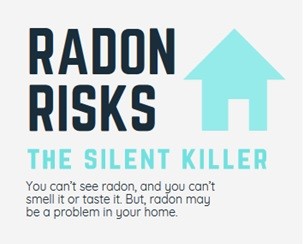January is National Radon Action Month
Nora Rhoades, Family and Youth Development Agent
If you live in Kansas, there’s a decent chance your home will test
positive for radon, an odorless, colorless gas that is the leading cause of
lung cancer in non-smokers.
“One in four homes in Kansas will test at or above the EPA’s radon
action level,” said Bruce Snead, director of the Kansas Radon Program at Kansas State University. He referred to the
Environmental Protection Agency’s radon action level of 4.0 picocuries of radon
per liter of indoor air.
To help raise awareness and encourage people to have their homes
tested, the EPA has deemed January National Radon Action Month. Kansas Gov.
Jeff Colyer signed a proclamation Dec. 18 recognizing the month in the state.
Radon occurs naturally in the soil. Its levels are low outdoors
because its effects are diluted, but indoor levels can build and lead to lung
cancer. And Kansas soils generate significant amounts of radon leading to the
potential for homes to have elevated concentrations of this naturally-occurring
class A carcinogen.
Snead encourages all homeowners to test for radon. Test kits can
be obtained from your local Post Rock District Office in Beloit, Lincoln,
Mankato, Osborne or Smith Center for a reduced fee, which includes a lab
analysis. Kits can also be ordered online at www.sosradon.org at retail price.
More than 112,000 radon measurements have been reported in Kansas,
according to the Kansas Department of Health and Environment. The agency
indicates that the statewide average indoor radon level in Kansas is 4.9
picocuries of radon per liter (pCi/L), which is above the EPA threshold of 4.0.
For homeowners who test and find elevated radon levels in their
homes, the most common technique to reduce it is called Active Soil
Depressurization. An ASD mitigation system is a permanently-installed
pipe-and-fan system that places a direct constant vacuum on the soil beneath
the home’s foundation, so the amount of radon that can penetrate into the
living space is reduced.
More information about radon, testing and mitigation is available
at kansasradonprogram.org/home or by calling the Kansas Radon Hotline at 1-800-693-5343.








